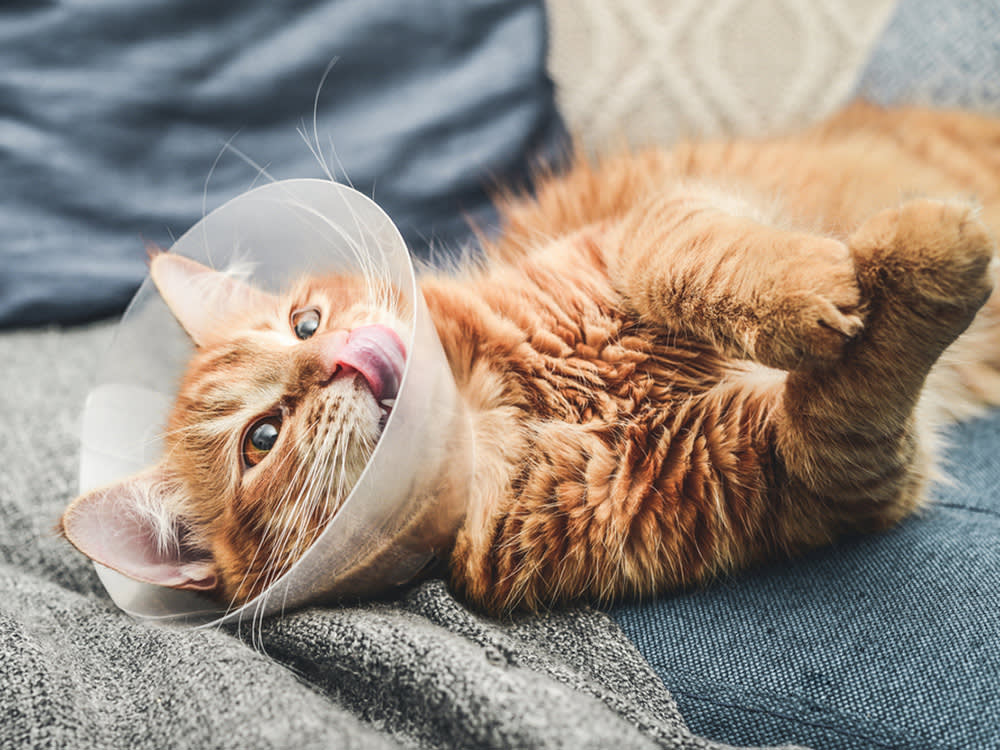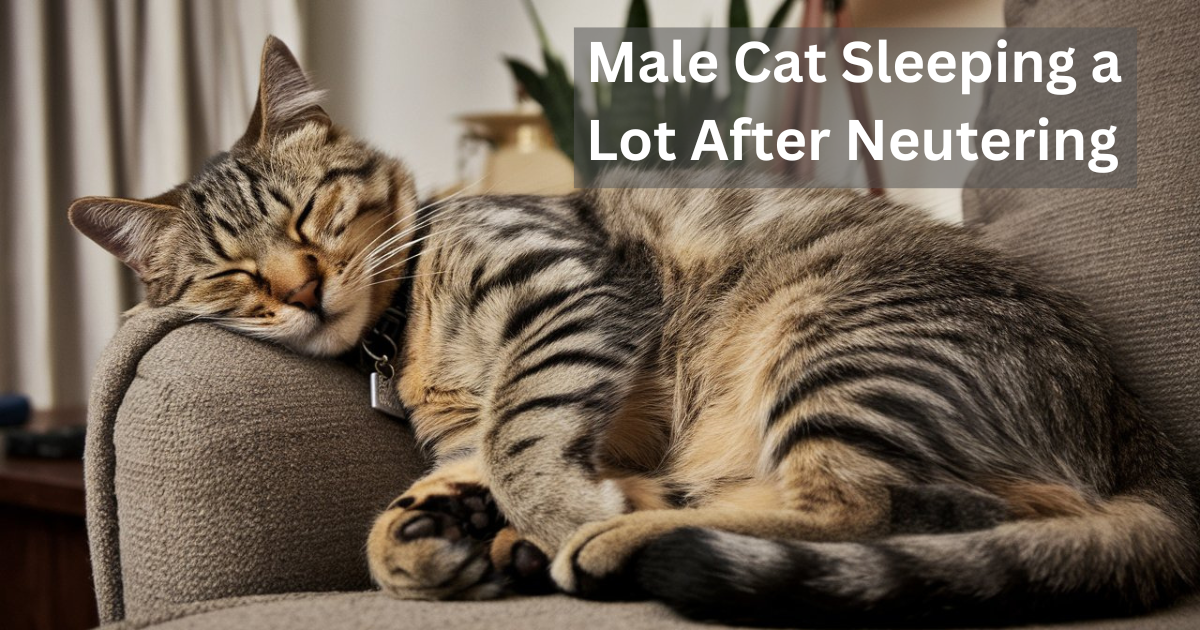Male cats typically sleep more after neutering due to the physical and psychological effects of surgery. This increased rest aids in their recovery process.
Neutering a male cat is a significant veterinary procedure that can influence your pet’s behavior, especially in the days following surgery. This common operation involves the removal of the testicles, which leads to hormonal changes in your feline friend. These changes, along with the general recovery from anesthesia, can result in your cat exhibiting lethargy or sleeping more than usual.
Pet owners must understand that this is a normal part of the healing process. Ensuring a quiet, comfortable resting area for your cat can facilitate a smoother recovery. Observing your cat’s behavior post-neutering helps in monitoring health and reassures you that your pet is on the right track toward a full recovery.

Post-neutering Fatigue: Normal Or Not?
Welcome to the cozy corner of cat care where we untangle the mysteries behind our feline friends’ behavior post-surgery. Your male cat has just been neutered, and you can’t help but notice he’s spending more time in dreamland than he used to. It’s natural to wonder if this spike in snoozing is a red flag or simply part of the healing process.
Comparing Pre- And Post-surgery Behavior
Observation is key to understanding how neutering impacts your cat. Cats are creatures of habit, and any disruption can throw them off. Let’s delve into how sleep patterns can change:
- Pre-surgery, cats often display energetic and sometimes erratic behavior, especially in males.
- After surgery, a temporary retreat into longer sleep is not unusual. It’s their way of healing.
Keep a log. Note his usual active hours and compare them with his current resting periods. This data can shed light on how your cat’s routine shifts.
Evaluating Normal Recovery Sleep Patterns
Post-operative snoozing shouldn’t be a cause for alarm. Neutering is, after all, a surgery. A proper recovery requires extra rest. But what’s normal?
| Timeframe | Expected Behavior |
|---|---|
| First 24 Hours | Sleep will dominate as anesthesia wears off. |
| 2-3 Days Post-Surgery | Mild increase in rest; alertness should slowly return. |
| After 1 Week | Sleep patterns should start aligning with pre-surgery behavior. |
If your cat’s sleep extends beyond these general guidelines, consider a vet check-up. Keep his bed warm and quiet to promote a healing environment.

Credit: www.thewildest.com
Factors Influencing Post-surgical Slumber
Your male cat has just been neutered. You notice he’s sleeping more. It’s common for cats to rest longer after surgery. The reasons can vary. Let’s explore what factors affect your feline friend’s sleep.
Anesthetic Aftereffects On Feline Sleep
Anesthesia can make cats groggy. After neutering, the drugs used take time to wear off. The effects lead to longer sleep times. This helps your cat recover.
- Type of anesthesia used
- Individual response to anesthesia
- Overall health and age of the cat
Pain Management And Increased Sleep Needs
Neutering can be painful. Cats often need pain relief post-surgery. Pain medications can make your cat sleepier. This is because they help relieve discomfort, letting your cat rest.
| Pain Medication | Effect on Sleep |
|---|---|
| Anti-inflammatories | May cause drowsiness |
| Opioids | Often lead to increased sleep |
Monitoring Your Male Cat’s Recovery
Neutering your male cat is a responsible step towards his wellbeing. After this routine surgery, adequate rest is crucial for a smooth recovery. It’s typical for your cat to sleep more post-procedure, but it’s your job to watch for any strange behaviors. The following sections will guide you on what to focus on during his recovery period.
Observing Sleep And Alertness Levels
It’s normal for your cat to sleep a lot after being neutered. But, you should notice him gradually regain alertness. Track how much he rests and how he behaves when awake.
- Day 1-2: Expect more sleep than usual.
- Day 3-4: Alertness should slowly increase.
- By Day 5: Sleep patterns should start to normalize.
Keep his resting area calm and comfortable to encourage restful sleep.
Identifying Signs Of Complications
While most cats recover without issues, watch for signs that may indicate complications.
| Signs of Complications | Action Needed |
|---|---|
| Excessive lethargy | Contact your vet immediately |
| Lack of appetite | Monitor closely, report if persists |
| Redness or swelling | Look for improvement daily |
Keep an eye out for any unexpected changes in his behavior ranging from refusal to eat to signs of pain. Reach out to a vet if anything seems off.

Credit: www.amazon.com
Enhancing Comfort During Recovery
After a male cat undergoes neutering, a cozy, stress-free environment is crucial for healing. Cats often sleep more after surgery as they recover. A comfortable recovery space can significantly ease this process. Ensure the cat’s quiet and safety for the best healing experience.
Creating A Calming Recovery Space
A tranquil area aids in your cat’s fast recovery.
- Choose a low-traffic room.
- Prepare a soft bed with their favorite blanket.
- Access to fresh water eases their comfort.
- Keep food close, but not too close to litter.
- Maintain a consistent temperature.
- Dim lights encourage rest.
Remember, a peaceful space encourages restful sleep and faster healing.
Managing Activity And Interaction Post-surgery
Limited activity promotes healing and prevents complications.
- Restrict jumping and strenuous play.
- Use a small room or crate for control.
- Avoid other pets to reduce stress.
- Monitor the surgery site daily.
- Give prescribed medications on time.
- Offer short, supervised outside time only.
Proper rest and gentle care will ensure a smooth transition back to daily life.
When To Contact The Vet
It’s standard for male cats to sleep more after getting neutered. But sometimes, sleeping can signal something’s wrong. Knowing when to reach out to your vet is crucial. Let’s learn to tell normal rest from signs of possible illness and understand the normal timeline for recovery.
Distinguishing Exhaustion From Illness
Neutering is surgery, and like all surgeries, it requires recovery time. Normal sleep should seem peaceful and regular. But, you should contact your vet if you notice:
- Non-stop sleeping with no active periods
- Lack of interest in food or water
- Signs of pain when your cat is awake
- Any unusual discharge or odor from the surgery site
These could be signs of complications. Your vet can offer advice or request a check-up.
Timeline For Post-neutering Concerns
Recovery usually happens within a week. Here’s a quick guide on what to watch for and when:
| Time After Surgery | Normal Behaviors | Reasons to Contact Vet |
|---|---|---|
| First 24 hours | More sleep, less active | Excessive grogginess or no movement |
| 2-3 days | Sleeping, but showing interest in environment | No interest in food or water, no litter box visits |
| One week | Mostly back to normal | Lethargy, signs of infection at the incision site |
If you notice any troubling signs, do not wait. Contact your vet immediately.
Fostering A Smooth Transition Back To Normalcy
Fostering a Smooth Transition Back to Normalcy for your male cat after neutering is essential. Post-operative rest is critical for healing. Yet, excessive sleep may worry some pet owners. Understanding this behavior helps ensure your cat returns to his vibrant self safely.
Gradual Reintroduction To Routine
After surgery, your cat’s usual activities will need a slow restart. It prevents strain on the healing site. Short, supervised play sessions encourage movement without overexertion. Keep a cozy recovery area available at all times. Lastly, limit high jumps and rough play.
- Offer short playtimes initially.
- Maintain a quiet recovery space.
- Avoid strenuous activities until fully healed.
Soothing interactions, like gentle petting, also aid relaxation and recovery. Your presence reassures your cat, promoting restful sleep for quicker recovery.
Nutrition And Care For Optimal Healing
Nutrition plays a pivotal role in post-neuter recovery. High-quality food supports tissue repair and energy needs. Offer small, frequent meals to accommodate a possible reduced appetite.
| Time | Type of Food | Portion Size |
|---|---|---|
| Morning | Wet Food | Small |
| Afternoon | Dry Food | Small |
| Evening | Wet Food | Small |
Ensure fresh water is always within reach, promoting hydration for healing. Keep the litter box clean to prevent infection. Regular check-ups with the vet confirm the recovery is on track.
- Provide high-quality food for tissue repair.
- Keep water nearby for easy hydration.
- Regularly clean the litter box.
- Schedule follow-up vet visits to monitor healing.
Frequently Asked Questions For Male Cat Sleeping A Lot After Neutering
Is Increased Sleep Normal After Cat Neutering?
Yes, it is normal for male cats to sleep more after being neutered. The procedure involves anesthesia, which may cause cats to be groggy and sleep heavily as they recover. Additionally, rest is crucial for healing, so extra sleep aids in their recovery process.
How Long Will My Cat Sleep After Neutering?
Most cats will experience increased sleepiness for 24 to 48 hours post-neutering. As the effects of the anesthesia wear off, you should notice your cat gradually returning to normal activity levels. If excessive sleepiness persists, consult your veterinarian.
Can Neutering Affect My Cat’s Behavior?
Neutering can indeed affect a male cat’s behavior. Besides reducing aggression and territorial marking, it can also lead to a calmer demeanor. While extra sleep is common immediately after the procedure, overall behavior should stabilize as the cat heals.
What Should I Watch For Post-neuter Surgery?
After neutering, monitor your cat for excessive lethargy, loss of appetite, or signs of infection at the surgery site. Also, ensure they’re not disturbing their stitches. Contact your vet if you notice anything concerning or if sleep patterns don’t improve.
Conclusion
Rest assured, it’s normal for your feline friend to sleep more post-neutering. This period allows him to heal and regain his usual lively spirit. If excessive sleep persists, consulting a vet is wise. Remember, a healthy cat is an active cat once recovery is complete.
Care and patience now mean a happier pet later.





Leave a Reply